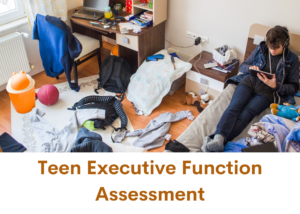Metropolitan Counseling Associates
Executive Function Assessment Teen

Executive Function Assessment-Teen
Instructions: This assessment is designed to evaluate 12 executive functions. Answer each question based on how often the statement applies to you. Use the following scale:
1 – Never 2 – Rarely 3 – Sometimes 4 – Often 5 – Always
Response Inhibition-Impulse Control
- speak or act without thinking about the consequences.
- I blurt out answers before hearing the full question.
- I have trouble stopping myself from doing things I know I shouldn’t.
- I interrupt others while they are talking.
- I make decisions quickly before thinking.
Working Memory
- I forget homework assignments unless I write them down.
- I struggle to follow multi-step instructions.
- I have difficulty remembering important dates (tests, due dates, events)
- I often forget where I put things like books, phone, or school supplies.
- I forget what the teacher instructed when I start a task.
Emotional Control
- I get upset easily when things don’t go my way.
- I have trouble calming down after getting angry or frustrated.
- My emotions sometimes get in the way of making good decisions.
- I react strongly to small problems.
- I have a hard time managing my emotions.
Task Initiation
16.. I put off starting homework until the last minute
17. I struggle to begin projects, even when I know I should start early.
18. I wait until someone reminds me to start my tasks.
19. I avoid doing difficult or boring tasks.
20. I have a hard time doing things when I am not motivated.
Planning & Prioritization
- I have trouble figuring out the steps needed to complete school assignments.
- I often feel overwhelmed by the number of things I need to do.
- I don’t always know which homework assignments to complete first.
- I forget to plan ahead for big projects or test.
- I often run out of time to fully prepare for a test.
Organization
- My backpack, desk, or room is usually messy.
- I lose important papers or assignments.
- I have trouble keeping track of my schedule.
- I struggle to make and use to-do lists effectively.
- I am often late because I can’t find what I need.
Time Management
- often run out of time to finish homework or projects.
- I have difficulty estimating how long tasks will take.
- I am often late to school or other commitments.
- I get distracted and don’t realize how much time has passed.
- I have trouble managing my schedule.
Goal-Directed Persistence
- I give up on difficult schoolwork quickly.
- I struggle to stay motivated on long-term projects.
- I abandon activities before completing them.
- I get discouraged when I don’t see quick results.
- I have trouble breaking my tasks down into tasks.
Flexibility
- I get frustrated when plans change suddenly.
- I struggle when a teacher or coach changes expectations.
- I have trouble switching from one activity to another.
- I don’t like when my daily routine is disrupted.
- I have a hard time adjusting to big transitions.
Metacognition (Self-Reflection)
- I have trouble figuring out what I need to improve in school.
- I don’t think about whether my study strategies are working.
- I rarely reflect on mistakes to learn from them.
- I don’t adjust my approach even when I know it’s not working.
- I have difficulty thinking about what I am doing in real time.
Sustained Attention
- I get distracted easily in class.
- I struggle to stay focused when doing homework.
- My mind often wanders when I need to concentrate.
- I have difficulty ignoring background noise.
- I have trouble staying focused when I notice other thoughts or ideas.
Stress Management
56.I feel overwhelmed when I have too much to do.
57. I struggle to stay calm during tests or presentations.
58.I avoid difficult situations because they stress me out.
59. I shut down when I feel too much pressure.
60. I avoid people and situations that make me stressed.
Scoring & Interpretation: Lower scores indicate stronger executive function skills, while higher scores suggest areas for improvement. This assessment can be used to identify challenges and develop strategies for growth.
